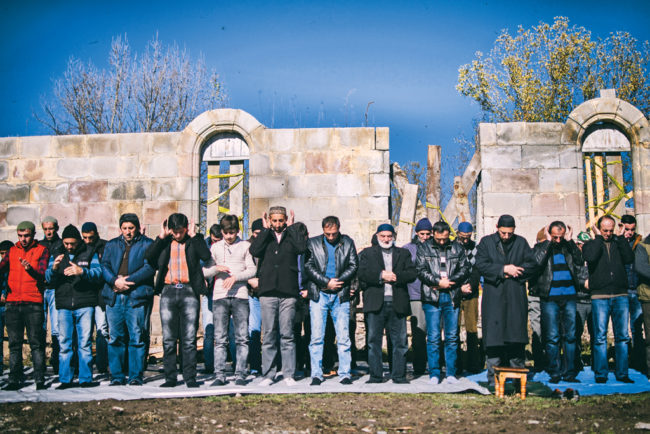
 The authorities of southern Georgia’s Adigeni District have began sealing off the ruins of the ‘disputed building’ in the village of Mokhe, which has been claimed both by local Christian and Muslim communities. Georgia’s National Agency for Cultural Heritage Preservation told OC Media that the building is being prepared to undergo conservation.
The authorities of southern Georgia’s Adigeni District have began sealing off the ruins of the ‘disputed building’ in the village of Mokhe, which has been claimed both by local Christian and Muslim communities. Georgia’s National Agency for Cultural Heritage Preservation told OC Media that the building is being prepared to undergo conservation.
Two years ago, the ruins spurred a conflict between local Christian and Muslim communities, who disagree whether the building used to be a church or a mosque. Since October 2016, the building has been surrounded by a yellow police tape and to prevent local Muslims from praying inside.
Growing tension
Mokhe is a predominantly Muslim village. Despite being a majority in the village, local Muslims claim they face discrimination on behalf of local authorities who are Christian.
The first tension between the two communities appeared in 2014, when the municipality announced its plans to turn the building into a library. Construction workers who showed up in the village, accompanied by the police, were met by members of the local Muslim community who tried to prevent the construction works. A clash with police occurred and fourteen protesters were arrested.
The 2015 report by Georgia’s Public Defender says that local Muslims complained about verbal and physical abuse from the police, who called them ‘Tatars’, which is a slur for Georgian Muslims. The report confirms that the protesters had signs of physical violence used against them. No official investigation to the case was opened.
In October 2016, when local Muslims held prayers inside the building’s walls, police blocked the entrance and taped off the building due to a protest by members of local Christian community. Since then, local Muslims have been praying in front of the ruins.
There is no other mosque in Mokhe and the Muslim community have been also using a private house for prayers.
The disputed past of the ruins
In late 2014, an official commission was created to determine the origins of the ruins. Zaza Vashakmadze, the head of the State Agency of Religious Issues told Liberali in October 2016 that the issue would be solved through consensus, as the archaeological expertise would cost up to $200,000. The commission announced its decision in May 2017, saying that the building couldn’t be attributed to either side.
According to the commission, its main achievement over the years has been ‘restoring dialog between people’. The commission ruled to give local Muslim community a plot of land in the village for constructing a new mosque, declaring the ruins a cultural heritage site named ‘Disputed Building’. It also asked the National Agency for Cultural Heritage Preservation of Georgia to ensure maintenance and preservation of the ‘Disputed Building’.
Mokhe’s Muslim community has refused the offer and continued to hold prayers in front of the old ruins. They have expressed dissatisfaction with the commission’s decision, believing it was an attempt at silencing them.
‘A neutral establishment’
Since the beginning of the conflict, the Georgian Orthodox Church has insisted that the ruins were of Christian origins. In a briefing held in October 2014, the Metropolitan of Akhaltsikhe and Tao-Klarjeti, Teodore Chuadze said that archaeological research would prove that there never was a mosque in the place of the building which was constructed on the ruins of a Christian monastery.
‘We demand this building to be delivered to the Patriarchate of Georgia for further management’, Chuadze said.
He also mentioned that local Christians were in favour of a ‘neutral establishment’, which would not be ‘insulting for either religions’.
In the October 2016, when members of Mokhe’s Muslim community first entered the building for prayers, Chuadze held another briefing, where he denounced their actions as ‘provocative’ and called on the Public Defender as well as NGOs to protect the rights of Christians in Mokhe and nearby villages where they represent a minority.
Local Muslims told OC Media’s correspondent in late 2016 that local Christians were under the influence of the clergy. Some of them believed that local Christian authorities were afraid of losing control over their parishes and wanted to prevent more mosques from being built.




 14 September 2017
14 September 2017


